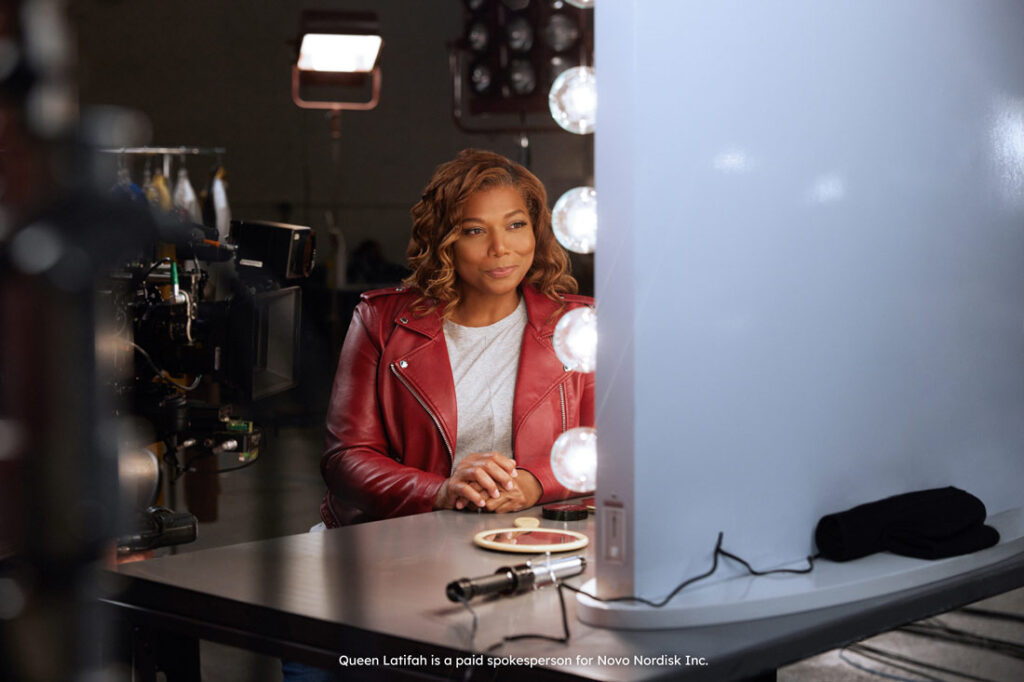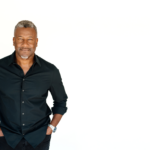Whatever’s going on in the inclusivity world, one superstar hip-hop icon is here for it. Queen Latifah has just joined forces with Novo Nordisk’s It’s Bigger Than Me campaign to lend her voice to the leading global health-care company’s new Inclusive Obesity Care (IOC) initiative. She champions the changes necessary for the world to focus less on weight loss and more on body acceptance.
Novo Nordisk is by her side, taking on the obesity problem by helping health-care providers do a better job when patients come in seeking care. Job number one is to make the IOC logo synonymous with safe spaces that are free from bias and filled with empathetic care for people living with obesity. Novo’s plan is to work directly with its current roster of health-care providers to display the Inclusive Obesity Care branding in practices as a means to demonstrate the providers’ support for judgment-free care.
Latifah is perfect for the role of spokesperson because she has seen the impact of obesity within her own family. She segues seamlessly between her roles as a singer, actor, TV show host, fierce advocate for the many causes she believes in and, most recently, she’s been named as one of 2023’s Kennedy Center lifetime artistic achievement honorees. She brings her A game to every project—picking up awards from Grammys and Emmys to Critics’ Choice and Golden Globes— without ever being defined by anyone else’s standards.
SUCCESS: Let’s first talk about how you got involved with this Inclusive Obesity Care initiative?
Queen Latifah: I was shooting a movie. They flew out to New Mexico. We sat down and we had a conversation. It was literally that simple. We talked about what Novo’s goal was with the It’s Bigger Than Me campaign: the whole idea was to remove the stigma around obesity, remove the judgment and look at treating it as a disease. This is a health care issue, not some sort of character flaw.
That seems like a step in the right direction. What was your response to that?
QL: I’m all for that. Because my experiences throughout my lifetime and my career allow me to relate to everyday people and what they’ve gone through. It’s always going to be a topic of conversation. My cousin died from complications of obesity, so I watched firsthand as she struggled for years and years, up and down, with not just the physical aspects of it but the emotional aspects of it, too. She dealt with the public reaction to her morbid obesity.
There’s such a sense of shame that goes hand-in-hand with obesity. And it’s not just friends, family and strangers casting shame, but even some health-care workers, too.
QL: And it’s not even just morbid obesity that garners those reactions. Even people who are overweight hear the same things. When you go to a doctor and that doctor is the first person you experience an issue with in terms of talking about your weight, that’s not necessarily what you’re looking for. They give you this “Maybe you should lose a little weight” response, and just leave it at that. By the time someone can get to the doctor to ask for that help, who knows what they’ve been through growing up, what they’ve been through in school, what they’ve been through in the world?
Recent studies found some doctors treat overweight patients with less empathy. And despite the epidemic nature of obesity, medical schools aren’t prioritizing educating students on how best to care for those patients. Is it possible to flip that script?
QL: We’re so body conscious. And image is so important. But when you’re at a doctor’s office, we are talking about health. So when you go to your doctor, you are seeking health care. And we need to make sure that people are going to their doctors and receiving the health care that they deserve—without judgment, without stigma and without an uneducated doctor who could be giving them the wrong information.
What would be a more compassionate response from a doctor?
QL: If doctors are saying, “Listen, we support you. You won’t be judged here. We want you to be treated as a patient. We want to care for you compassionately, and we’re here to talk about it.” That’s what needs to happen. This Inclusive Obesity Care program that’s being launched is the symbol of hope, and something that lets patients know they are welcome there.
It sounds like some doctors are more than just dismissive about obesity; they can be almost discriminatory.
QL: Discriminatory, and in some cases, delusional. Because so many health-care providers are in the same boat. If more that 40% of Americans are living with obesity, some of those are doctors and nurses who are obese. And it has to start somewhere. We have to keep confronting it, bringing it up and making sure that there are tools and places where people can go to get access to more understanding. They can let themselves off the hook, stop judging themselves, stop feeling that stigma. Even people who care about someone who is obese might say, “You should lose a little bit of weight.”
Is that necessarily a bad thing, to have someone who cares about you tell you to lose weight?
QL: It might not be so easy for someone with obesity to do that as it is for someone else. And if it’s coming from someone you love, but you’re just thinking, “My body does not do that the way yours may do it.”
If that’s coming from people who care, I would imagine it’s that much more difficult to hear it from a doctor.
QL: One survey showed that 66% of participants who reported a history of weight stigma experienced it from doctors, which makes them not want to seek health care. And ultimately, we want that to change. We want people to take care of themselves and feel that they’re comfortable in a safe environment. That’s the goal.
You’ve already been an outspoken voice for body positivity and inclusivity, but is this the first time you’re taking on obesity in such a significant way?
QL: I think I’ve always been very supportive of everyone. And inclusive of everyone. I see myself in everyone in some sort of way. You may see my brown skin, but my family is very diverse. I saw everything in my family before I even had a chance to become Queen Latifah. So I’ve always felt connected to human beings, period. And whenever I see injustice, and there’s an opportunity to change that and level the playing field, I’m inclined to get involved. I think this is so important. We’ve got to change the world. We’ve got to make a little noise. And however we have to do it is what we have to do.
Photo courtesy of It’s Bigger Than Me










